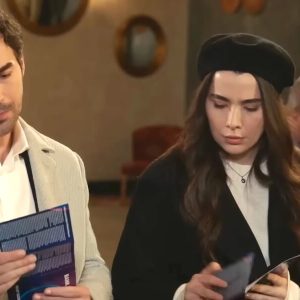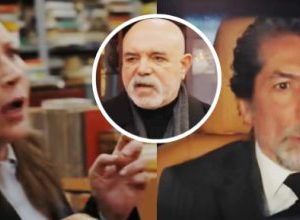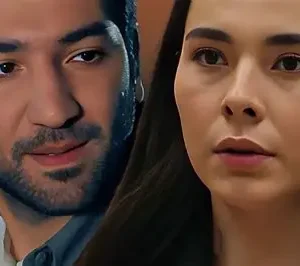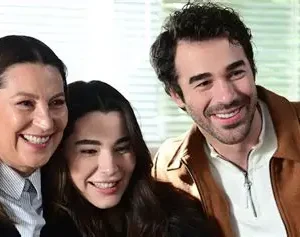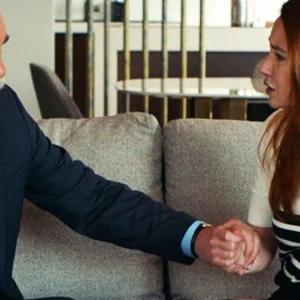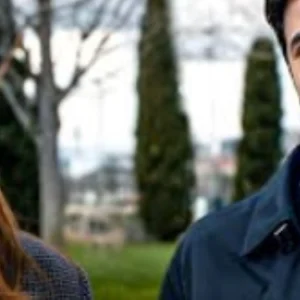The villa once shrouded in privilege and elegance is now steeped in anguish and betrayal, and it is Yesim who carries the heaviest burden as she arrives at the gates of Güzide’s estate, frozen by shame and uncertainty. Her steps falter and her eyes remain low, haunted by the choices that shattered her world. Retreating to the office she once shared with Umit, she tries to gather what little remains of her dignity along with her belongings, her hands trembling as she picks up scattered fragments of her life—books, notes, and memories that now sting like broken glass. But peace is denied to her even in solitude, as Umit appears at the door, his presence heavy with guilt and unresolved feelings. Yesim breaks under the weight of humiliation, sinking into tears as she confesses the irreversible mistake of following her heart, only to be punished by the cruelty of Tarik who not only rejected her love but orchestrated her downfall with calculated malice, sending someone to record her every move and weaponizing those images to destroy her. Yet nothing prepares her for the next revelation, for the betrayal that truly devastates comes not from an enemy but from the man beside her—Umit, who quietly admits that it was he who informed Tarik in a desperate act of jealousy and love twisted by weakness. Yesim’s shock is absolute, her heartbreak morphing into fury as she realizes that the one man she thought she could trust had been her executioner all along.

As the storm within Yesim brews with quiet despair, elsewhere Ipek stands in front of a mirror dressed in white lace and layered expectations, looking like a bride out of a dream but feeling like a prisoner in disguise. Her hands shake as she adjusts her veil, doubts swirling louder than the city traffic outside. Neva tries to comfort her with an heirloom silver brooch and whispered reassurances that Oltan will be moved, that the ceremony will soften his heart. But when Ipek arrives, escorted by Neva’s unwavering presence, the coldness of her groom freezes every glimmer of hope. Oltan, rigid and remote, refuses even to wear his ceremonial attire, and when the time comes to exchange vows, the silence is louder than bells, the distance between them more vast than any aisle. After the rushed signatures, Oltan demands she leave immediately, revealing that the marriage was a farce signed only out of respect for Sezai and to give the unborn child a name—not love, not unity, not future. Ipek crumbles, pleading through tears for a chance, for mercy, for anything—but Oltan is ice and iron, dismissing her as a mistake he has chosen to correct with brutal finality. He grabs her arm not with passion but disdain and spits the truth: they are bound only by a contract, not by heart. Ipek’s spirit fractures in silence as she walks out, wedding dress clenched in trembling fists, tears etching paths of despair down her face as Neva rushes to hold her, only to hear the shattering words that there is no love left, only hatred.
In another corner of this fractured world, tension mounts between Mualla and Cadrie, locked in a domestic power struggle that reeks of disdain and unresolved pasts. Cadrie remains composed, claiming her right to stay in the house invited by her son Caraman, while Mualla seethes, the presence of this uninvited matriarch like salt on an old wound. Their standoff is disrupted only by Ilknur, the household help caught in the crossfire of status and servitude, bringing cake as an olive branch, only to be berated by Mualla for failing to dust a cabinet. The humiliation slices deep, and later Ilknur finds solace with Cadrie, confiding that working in this house feels more like slavery than service, that Mualla does not see her or anyone else as human. Yet even as she voices her pain, Ilknur holds her chin high, whispering later to Oznur that she acts under Mualla’s secret command, a special task that grants her immunity. Her confidence may be a mask or a weapon—but either way, it reflects the hierarchy of fear that rules this mansion, a place where cruelty cloaks itself as order and loyalty is just another form of control.
Meanwhile, Sezai stands on the precipice of despair. In a quiet rooftop meeting with Nazan, he confesses with a hollow voice that he has lost everything—his daughter, Güzide, and now his purpose. He asks Nazan to protect Güzide no matter what, the weight of his words foreshadowing a final farewell. When he returns to his hotel, he checks out with somber finality and begins packing. But destiny, it seems, has one more twist in store. Caraman, curious about Sezai’s departure, visits him and is struck by a birthmark on Sezai’s back—a twin to one on his own body. Rushing to his office, he tears off his shirt and stares into the mirror, horrified and transfixed by the identical mark. Questions rise like smoke in his mind: Could it be? Could the man leaving the city be his true father? The ground beneath him shakes as years of identity begin to unravel. In a world where lies have shaped lineage and betrayal defines loyalty, Caraman is now faced with the one truth that can destroy everything he thought he knew about his blood, his roots, his very existence.
